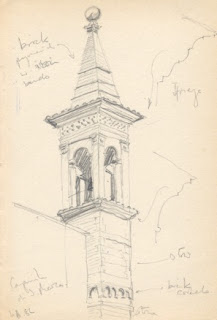This is the third of Dr Cullinan's talks. Today is Friday, so a day of abstinance, even if you have not been able to take up the bishops' invitation to fasting for these Ember Days!
THE BANQUETING CHAMBER
And on the day called Sunday, all who live in cities or in the country gather together to one place, and the memoirs of the apostles or the writings of the prophets are read, as long as time permits; then, when the reader has ceased, the president verbally instructs, and exhorts to the imitation of these good things. Then we all rise together and pray, and, as we before said, when our prayer is ended, bread and wine and water are brought, and the president in like manner offers prayers and thanksgivings, according to his ability, and the people assent, saying Amen; and there is a distribution to each, and a participation of that over which thanks have been given, and to those who are absent a portion is sent by the deacons. And they who are well to do, and willing, give what each thinks fit; and what is collected is deposited with the president, who succours the orphans and widows and those who, through sickness or any other cause, are in want, and those who are in bonds and the strangers sojourning among us, and in a word takes care of all who are in need.
I think that’s the earliest description of a Mass. From the Apology of St Justin around AD 150. I hope it sounds familiar.
Of course the mysteries were kept secret then. Only the baptized were allowed in. Rather like the Warrant Officers allowed into the anteroom for a glass of sherry, but not into the Officers’ Mess, the catechumens were kept out. Even St Gregory the Great is reluctant to speak to another bishop of the Mass of the Faithful.
But it’s time for us to go into the Chamber now.
The newly baptized would have been robed in white. To show their sinlessness and their priestly state. We should be reconciled by now, not only to God but to each other.
When they put the Creed into the Roman Rite, at the end of the first millennium, it was put before the beginning of the Offertory, but I think it belongs in the chamber because it is a prayer only the faithful can make.
In the Old Rite the priest sings Dominus vobiscum and Oremus, but no prayer follows it, as it usually does. This was where the Prayer of the Faithful used to be, until it was removed around AD 500. They’ve brought it back in the New Rite, not always very felicitously, and sometimes burdening us with a torrent of words, but it has a right to be there because it belongs to our common baptismal priesthood to intercede, and it makes us think of wider needs than those of our own selves or our own group.
So it won’t do any harm this retreat to pray for others as well as ourselves.































